
JOURNAL OF PESTICIDE SCIENCE
Scope & Guideline
Empowering research for a healthier planet.
Introduction
Aims and Scopes
- Pesticide Development and Innovation:
The journal emphasizes research on the synthesis, characterization, and biological evaluation of new pesticides, including herbicides, insecticides, and fungicides, to enhance agricultural productivity while ensuring environmental safety. - Mechanisms of Action and Resistance:
A significant focus is given to studying the mechanisms through which pesticides exert their effects on target pests, as well as understanding resistance development in pest populations to inform better management practices. - Environmental Fate and Impact:
Research on the environmental behavior of pesticides, including their degradation, bioaccumulation potential, and ecological risks, is crucial for assessing their sustainability and safety in agricultural ecosystems. - Analytical Methods and Residue Analysis:
The journal publishes studies on advanced analytical techniques for detecting and quantifying pesticide residues in various matrices, which are essential for regulatory compliance and food safety. - Biological Control and Integrated Pest Management (IPM):
There is a growing interest in exploring alternative pest management strategies, including biological control agents and the integration of pesticides within IPM frameworks to minimize reliance on chemical pesticides.
Trending and Emerging
- Biodegradable and Green Pesticides:
Research on biodegradable pesticides and environmentally friendly alternatives is gaining momentum, reflecting the industry's shift towards sustainable agriculture and reduced environmental impact. - Nanotechnology in Pesticide Formulation:
The application of nanotechnology in pesticide formulation is emerging as a key area of interest, with studies focusing on enhancing the efficacy and reducing the environmental footprint of pesticide products. - Precision Agriculture and Pesticide Application:
There is an increasing trend towards integrating precision agriculture technologies with pesticide application, aiming to optimize usage and minimize waste through targeted delivery systems and real-time monitoring. - RNA Interference and Molecular Targets:
The exploration of RNA interference (RNAi) as a method for pest control and the identification of novel molecular targets for pesticides is on the rise, indicating a shift towards molecular-level pest management strategies. - Ecological Risk Assessment and Modeling:
There is a growing emphasis on ecological risk assessments and modeling approaches to predict the environmental impact of pesticides, reflecting a broader understanding of ecological interactions in agricultural systems.
Declining or Waning
- Traditional Chemical Pesticides:
There has been a noticeable decrease in studies solely focused on traditional chemical pesticides, as the field moves towards more sustainable and environmentally friendly pest management practices. - Basic Toxicity Studies:
Research focusing strictly on the acute toxicity of pesticides, without considering their ecological impact or mechanisms of action, has become less frequent, indicating a shift towards more integrated approaches that encompass broader ecological contexts. - Single-Method Approaches:
There is a decline in the use of single-method studies (e.g., only laboratory experiments) in favor of multi-disciplinary approaches that incorporate field studies, modeling, and ecological assessments to provide a more comprehensive understanding of pesticide impacts.
Similar Journals
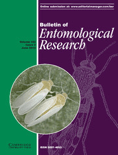
BULLETIN OF ENTOMOLOGICAL RESEARCH
Bridging the Gap Between Insects and Agricultural AdvancementsBULLETIN OF ENTOMOLOGICAL RESEARCH, published by Cambridge University Press, is a prestigious journal that has been at the forefront of entomological research since its inception in 1910. With an impressive track record extending through to 2024, this journal serves as a vital platform for advancing knowledge in various related fields, notably Agronomy and Crop Science and Insect Science, where it ranks in the top quartile (Q2) and maintains a commendable position within the Scopus rankings in its categories. Notably, its contributions also intersect with Medicine in a broader scope, fostering interdisciplinary insights. While access to the journal content is not classified as 'Open Access,' its rigorous peer-reviewed articles are crucial for researchers, professionals, and students seeking to enhance their understanding of entomology and its applications in agronomy and beyond. The journal's impact is reflected in its notable percentile rankings, emphasizing its relevance and influence in the academic community. Located at the heart of the UK, the BULLETIN OF ENTOMOLOGICAL RESEARCH continues to be an essential resource for those dedicated to the study and understanding of insects and their impacts on agriculture and health.

APPLIED ENTOMOLOGY AND ZOOLOGY
Championing the study of insects for ecological balance.Applied Entomology and Zoology, published by Springer Japan KK, is a pivotal journal in the field of insect science, with an impressive track record since its inception in 1966. This esteemed publication, bearing ISSN 0003-6862 and E-ISSN 1347-605X, contributes significantly to the understanding of applied entomology, emphasizing research that supports sustainable agricultural practices and the ecological conservation of insects. Ranked in the Q2 category (2023) for Insect Science with a Scopus rank of #65 out of 181, it is recognized for its rigorous peer-review process and high-quality contributions that push the boundaries of our knowledge. Although it does not currently offer open access, the journal remains an essential resource for researchers, professionals, and students eager to advance their understanding of the complex interactions between insects and their environment. With a focus on practical applications, it aims to bridge the gap between entomological research and real-world implications, fostering innovation and promoting informed decision-making within the scientific community.
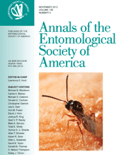
ANNALS OF THE ENTOMOLOGICAL SOCIETY OF AMERICA
Unveiling Nature's Secrets Through EntomologyANNALS OF THE ENTOMOLOGICAL SOCIETY OF AMERICA is a premier journal dedicated to advancing the field of insect science, published by Oxford University Press. With an impressive impact factor and classified in the Q1 quartile for its category, this journal ranks among the top publications in agricultural and biological sciences, specifically within insect science, positioned at #28 out of 181, indicating its significant influence and high-quality research contributions. The journal aims to disseminate original research, comprehensive reviews, and groundbreaking findings that enhance our understanding of entomology, spanning across ecological, evolutionary, and applied segments. With a consistent publication history since 1938, researchers, professionals, and students will benefit from the wealth of knowledge presented in its pages. Although the journal does not currently offer open access, it remains a vital resource for those seeking to stay at the forefront of entomological research and innovation.
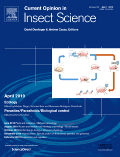
Current Opinion in Insect Science
Advancing the Frontiers of Insect KnowledgeCurrent Opinion in Insect Science is a leading academic journal published by ELSEVIER, dedicated to advancing understanding in the field of insect science. With an impressive impact factor reflected in its top quartile rankings (Q1) within both Ecology, Evolution, Behavior and Systematics and Insect Science, the journal holds a prominent position, ranking 3rd out of 181 journals in Insect Science and 35th out of 721 in Ecology-related fields according to Scopus for 2023. Since its inception in 2014, the journal has provided a dynamic platform for researchers, professionals, and students to explore and share cutting-edge developments and insights, targeting crucial topics in insect biology, ecology, and systematics. Although there are no open access options available, Current Opinion in Insect Science remains an essential resource for those looking to stay at the forefront of their research or academic interests.

Zemdirbyste-Agriculture
Harvesting insights for a resilient agricultural landscape.Zemdirbyste-Agriculture is a prominent journal dedicated to advancing the field of agricultural sciences, with a particular focus on agronomy and crop science. Published by the Lithuanian Research Centre Agriculture & Forestry, this open access journal has been fostering knowledge sharing and scientific discourse since 2004, allowing researchers, professionals, and students unrestricted access to its content. Located in the beautiful country of Lithuania, specifically at Vytautas Magnus University, this journal plays a significant role in disseminating innovative research findings. With a 2023 Scopus ranking of #246 out of 406 in the category of Agricultural and Biological Sciences, Zemdirbyste-Agriculture falls within the Q3 quartile, reflecting its growing influence in the academic community. This journal, which has converged its publication focus from 2008 to 2023, aims to provide a platform for scientists to share their critical insights on agricultural practices, sustainability, and technological advancements in crop science, thereby contributing to the global discourse on food security and environmental health.
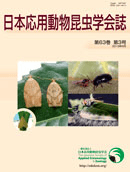
JAPANESE JOURNAL OF APPLIED ENTOMOLOGY AND ZOOLOGY
Exploring the Intricacies of Insect ScienceJapanese Journal of Applied Entomology and Zoology is a premier publication in the field of Insect Science, offering a platform for researchers and practitioners to share their findings on applied entomology and zoology. Established in 1957 and published by the Japan Society of Applied Entomology and Zoology, this journal aims to foster the understanding of insect-related studies that impact agriculture, ecology, and biodiversity. With an ISSN of 0021-4914 and E-ISSN of 1347-6068, it serves as a crucial resource for both academics and industry professionals. While the journal currently resides in the Q4 category of the Scopus ranking for Insect Science with a percentile of 11th, it plays a significant role in providing valuable insights into insect behavior, systematics, and their ecological roles. Readers can benefit from its published research to drive innovations and solutions in pest management and conservation practices. As the journal continues to evolve, it reinforces its commitment to disseminating critical research that supports sustainable practices in entomology and zoology through its convergence extending to the year 2024.
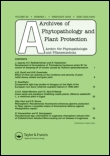
ARCHIVES OF PHYTOPATHOLOGY AND PLANT PROTECTION
Advancing Agricultural Solutions through Rigorous ResearchArchives of Phytopathology and Plant Protection, published by Taylor & Francis Ltd, stands as a pivotal platform in the field of agronomy and crop science since its inception in 1974. With an ISSN of 0323-5408 and E-ISSN of 1477-2906, this journal is dedicated to publishing high-quality, peer-reviewed research that addresses contemporary challenges in plant pathology and protection. As a Q3 ranked journal in its category with Scopus Rank #210/406, it serves a vital role in disseminating practical solutions and innovative discoveries to enhance agricultural productivity and sustainability. The journal fosters a rich exchange of ideas among researchers, professionals, and students, empowering them to contribute to the advancement of the agronomy and biological sciences. Despite being traditionally subscription-based, the journal's commitment to comprehensive and rigorous research makes it an essential resource for anyone invested in the future of plant health and agricultural innovation.

SPANISH JOURNAL OF AGRICULTURAL RESEARCH
Unveiling Insights in Agricultural Practices and SustainabilityThe Spanish Journal of Agricultural Research (ISSN: 1695-971X, E-ISSN: 2171-9292), published by the prestigious Consejo Superior Investigaciones Cientificas (CSIC), serves as a vital resource for those engaged in the fields of agronomy and crop science. Established as an Open Access journal since 2003, it aims to foster the dissemination of innovative research and practical applications related to agricultural practices and sustainability. With its Q3 category in Agronomy and Crop Science and a Scopus ranking of #224 out of 406, the journal provides an accessible platform for scholars to share valuable findings that enhance agricultural productivity and environmental stewardship. Covering research from 2006 to 2024, this journal continues to be instrumental for researchers, professionals, and students eager to remain at the forefront of agricultural science advancements.
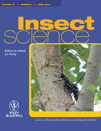
Insect Science
Fostering interdisciplinary dialogue in the world of insects.Insect Science, published by WILEY, stands as a prestigious journal in the realms of Agronomy, Biochemistry, Genetics, and Insect Ecology. The journal, with ISSN 1672-9609 and E-ISSN 1744-7917, has firmly established itself as a significant resource for researchers and professionals seeking to explore the intricate dynamics of insects and their crucial roles in ecosystems. With a remarkable impact factor placing it in the Q1 quartile across multiple categories, including Ecology and Evolution and Agronomy and Crop Science, Insect Science ranks impressively at #8 out of 181 in the realm of Insect Science on Scopus, showcasing its influence and relevance in the field. Spanning its coverage from 1994 to 2024, this journal invites contributions that advance our understanding of insect biology, behavior, and their interactions within agricultural contexts. The commitment to high-quality research and its role in fostering interdisciplinary dialogue make Insect Science an essential platform for scholars and practitioners at the forefront of insect-related studies.

Agrosystems Geosciences & Environment
Championing open access to vital environmental research.Agrosystems Geosciences & Environment, published by WILEY, is a premier open access journal dedicated to advancing the interdisciplinary field of agricultural and environmental sciences. With an E-ISSN of 2639-6696, the journal has gained recognition since its inception in 2018, currently holding a Q2 ranking in Agricultural and Biological Sciences, Plant Science, and Soil Science. Operating from the United Kingdom, Agrosystems Geosciences & Environment contributes significantly to knowledge generation and dissemination, offering vital insights into sustainable practices, soil management, and crop optimization. Researchers and professionals will find the open access model particularly advantageous, promoting greater visibility and engagement within the scientific community. By bridging the gap between geosciences and agrosystem management, this journal is vital for those committed to addressing today's critical environmental challenges.